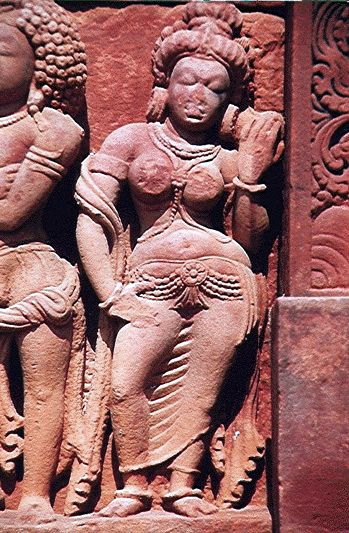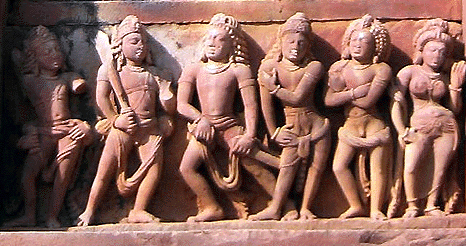Nepal in the Mahabharata Period, Part 49
BY: SUN STAFF - 4.1 2019

The Pandavas
(Left to right) Bhima, Arjuna, Yudhisthira, Nakula, Sahadeva and Draupadi
Dasavatar Temple, Deogarh
The Yadava dynasty's presence in Nepal, and the events that preceded and followed.
Barka Naach - Nepal's Tribal Mahabharata
Concluding our summary of Barka Naach, author Pradip Bhattacharya offers commentary on the last 5 of 10 songs comprising the Nepali Mahabharata. This tribal version of the epic concludes with 62 verses on the great war at Kurukshetra, and an epilogue describing the Pandavas' ascent to the heavens.
"The sixth song, "Gharbasak paidhar" deals with the journey to King Bairath and parking of the weapons in a "sainik" tree, in 25 stanzas. The choric refrain is the same as above. The brothers lament:
"For 12 years I have wandered with my broken dreams,
And all my knowledge has turned to ashes.
I have forgotten all I knew and now
I must tend grazing cows with Ahirs."
Bhim is reluctant to hide his club in case there is trouble in the city. Nakul appears to be singled out:
"Suffering stays with Nakul just as musk stays forever with the kasturi deer". Bairath allows them to stay provided they work as gardeners, take care of the stables, and work as gatekeepers. They agree. Yudhishthir sends Draupadi to serve the Queen.
The seventh song is "Hathiyak paidar" in 23 stanzas with the same choric refrain, in which Bairath forces Bhim to fight an elephant because Kanka (Yudhishthir) will not prevent a goat from destroying the king's fields. Bairath says if his elephant is killed, he will bear the loss, but otherwise Ballava (Bhim) has to die. Ballava is fed well with a hundred dishes and the elephant is intoxicated. Bhim has to fight in a torn loincloth, as there is no other. Bhim kills the elephant Bhauranand, removing its tusks to prove his strength, and accepts a betel nut offered by the king as a sign of friendship. Bairath requests him to protect the kingdom. Bhim agrees.
The eighth song is "Kichakak paidhar" that follows the Kichak-Draupadi episode of the epic in 28 stanzas with the refrain, "Whatever happens is the will of God". It begins with an enigmatic statement by Shakuni, who says that in November ghosts are at work, so he advises the Kauravas, "You now can call on the pure Queen Draupadi. But the important words are those of your nephews, And the days of Kichaka are over." This is not explained and is not connected to anything that follows.

Draupadi Devi
Dasavatar Temple, Deogarh
The Kauravas appears somehow to be related to Kichaka. There is an elaborate description of Draupadi's toilette, draping a shawl on her left shoulder, beautiful decorations on her hair, bracelets on wrists, rings on fingers, toes, ears, crying out "An Ahir spied on me as I dressed!" whose significance is not clear. She wears an embroidered sari with silken sashes, lines her eyes with kohl, vermilion on her forehead and goes to Kichaka's house. There is no assignation at night, but Kichaka takes Draupadi to the front door of his house, which is blocked by Ballava who kills him after a wrestling bout. Long after (much after the prescribed 14th day for the funeral ceremonies) the Kauravas hear the news and cremate his body, swearing revenge on Ballava. In the epic this is what the Upa-kichakas do.
The 9th song in 124 stanzas relates Susharma and Duryodhan's attack on King Bairath and has the refrain: "Bhim is one of the best and Arjun is the best of archers, But the Kauravas are going to steal all the cows." When Arjun sends Uttara to take down their weapons from the tree, they are all found destroyed, except Arjun who says, "My weapon has started talking. Wherever it is sent, it reaches its goal; And whatever task it is given, it achieves it." There is a single couplet of interest that seems to have been transposed from the dice-game, as it has no link with anything in this song:
"The challenge is yours, Bhim and Arjun, to prevent
The Kauravas from defiling their own sister-in-law."
Bhim has an invincible left shoulder with which he withstands all the special missiles flung at him by Susharma, who begs for sparing his life. Bhim demotes him to a lowly blacksmith from a king.
The 10th song concludes the great war in 62 stanzas, ending with Kunti telling them that the mighty Kshatriya they slew whose arms were as big and strong as his things and whose chest was wider than 8 yards was their older brother Karna. The killing of Duryodhan is not described, only his fleeing, dropping his parasol, which Uttara Kumar holds in triumph. There is an enigmatic stanza 52 at this stage:
"Don't go herding without your cattle.
Don't visit your in-laws without your wife.
A man's lips are not beautiful without a moustache!
Speak twice your mantra: "Weapon, weapon".
Stanza 53 is a puzzle, as it is not clear who is the speaker and it is unconnected with the dialogue that follows between the Pandavas and Kunti ending in her disclosure of Karna being their brother:
"Oh my sister Queen Kunti, I am your uncle.
You are my nephews; I have taught you and given you knowledge.
Now I request my teacher's fee."

The Pandavas
Dasavatar Temple, Deogarh
There is an Epilogue describing the ascent to heaven by the Pandavas, full of local touches. Bhim blocks the door after the brothers and Draupadi have eaten what Kunti has served. He announces with compassion that Kaliyuga has arrived. First Draupadi leaves for the north on the pilgrimage of fire. Then Sahadev, of whom the watchman says he shall never reach the state of holiness. The same is said for the remaining brothers.
Yudhishthir travels to heaven, sitting on the golden throne in Indra's palace and with Indra decides the path to be followed by his brothers and wife. He finds Bhim, Arjun, Nakul, Sahadev, and Draupadi, all there before him and asks them how this happened. Every one of them answers, "I came here through the wind. That is the only way to heaven, so I arrived here before you." So, indeed, has he.






































